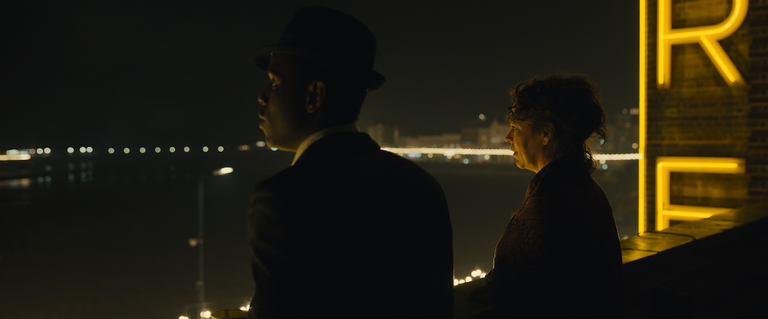Mendes and his cinematographer Roger Deakins utilize the all encompassing screen shape to underline how common lives unfurl inside a scene of history that the small figures in its forefront can't completely grasp. That's what the issue is, right away, every one of the characters are composed Little, not simply Hilary: dolls of "standard individuals" that would appear to be deigning in the event that the entertainers didn't give them life through non-verbal communication and sound, and in the event that Mendes and Deakins didn't casing and light them with such consideration.
In any case, he stays a deliberation for a really long time, to the place where it seems as though the film is setting him up as to a greater extent a plot gadget (or symbol of atonement) than a man. The film shudders with suggestions of looming destruction for Stephen, and the exchange makes reference to then-ongoing racial episodes. Yet, Mendes presents his displeasure, dread and trouble with the very separated gaze that freezes Hillary in her tracks when she sees skinheads torturing Stephen on a walkway. Furthermore, it appears to be less nice (in the way of a "home base" film) than leaned to stray for logical purposes. You can't determine whether a scene appears to be careless or endorsed or level on the grounds that the film would rather not give you a lot of too soon, or on the other hand in the event that one of those movies' can't choose how to manage itself.
However, in the long run, "Realm of Light" tracks down its depression and stays in it. The positive change is so unexpected and surefooted that it could make you can't help thinking about why the film didn't lay all its huge account and portrayal cards on the table in the initial couple of moments and leap to what's fascinating: the strain between the social commitment to assist with peopling who are pained or generally out of luck, versus the blow-back that will in general happen when the aides don't understand that their own impulses are in the blend, as well.
Colman occupies Hilary with her standard completion and perfect judgment, continuously investing her time into conveying the person's stirring, incongruous sentiments instead of focusing on the virtuoso stunts and quirks that over and over again imply Extraordinary Screen Acting: English Division
Ward can't match her in light of the fact that the material isn't on a similar level, yet all the same he's as yet wonderful. His most noteworthy accomplishment is persuading you that the person has his own inward life that is pretty much as confounded as Hilary's, despite the fact that there's little in the content to help such a case.
"Domain of Light" never totally connects, however it merits seeing for the force of Colman's lead execution and the masterfully passed judgment on reinforcement acting (by Firth particularly; Ellis is a small time sleaze ball with hallucinations of decency, and the entertainer presents him without publication remark, which causes his activities to feel all the more genuine).
Like Willis, who is most popular for shooting the "Guardian" films and a few exemplary neurotic thrill rides, Deakins loves outlines, long shadows, and high-contrast lighting. He won't hesitate to attempt to make a notable, predominantly strong picture, however here — working in subtler key than he's normally approached to play in — he appears to let the regular world aide his choices. The film's look decides in favor effortlessness, featuring magnificence that is as of now present as opposed to superimposing it with method and innovation.
There is certainly not a dull or simply utilitarian structure in the film, nor is there one that makes a good attempt to be significant that it pulverizes Mendes' shrinking bloom characters. Deakins lets entryway casings and window outlines, support swaggers, rooftop overhang, flight of stairs railings, and the lines of walkways and roads guide our eyes and make outlines inside outlines. The film even endeavors some multi-board impacts, similar to a grouping of specifically comparable canvases holding tight the mass of a display, and carries little effortlessness notes into each scene and allows us to find them all alone, apparently not stressed over whether we could miss them. Notice, for example, how he and Mendes will place an intelligent surface some place in the edge that allows us to see the essences of characters put in the closer view with their backs to the camera. You probably won't see the other person's appearance ok away on the grounds that they aren't noticeable at each second, just in some cases — as a genuine individual would be.
